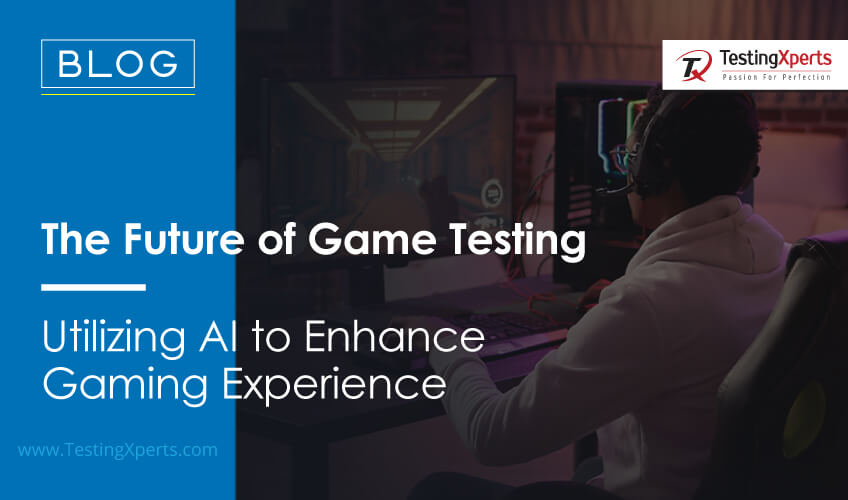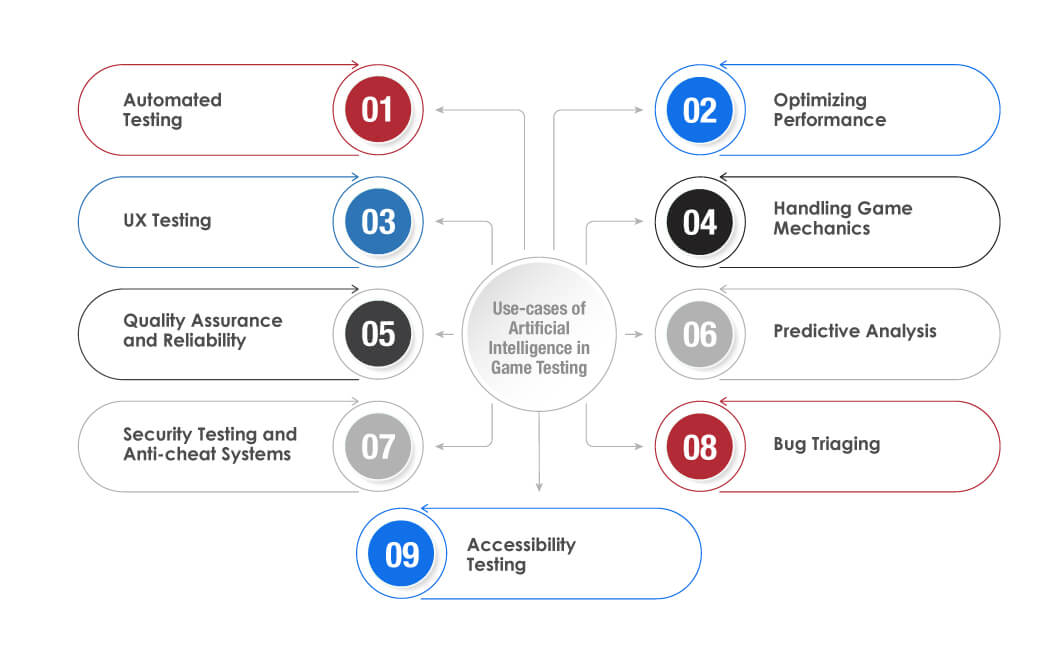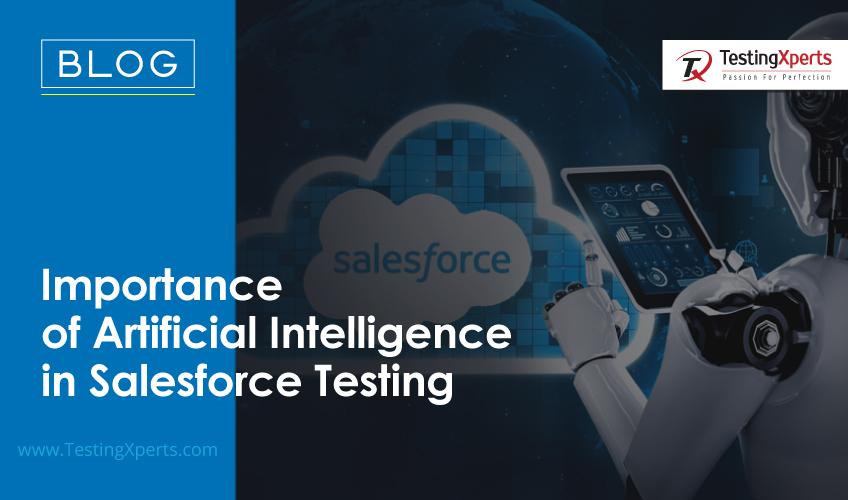
Table of Contents
- AI vs Traditional Game Testing
- Use cases of Artificial Intelligence in Game Testing
- Top 5 AI Tools for Testing Games
- Conclusion
- Why Partner with TestingXperts for Game Testing Services?
The gaming industry is one of the fastest-growing businesses, with over 3.22 billion gamers around the world. The diversity and number of games being developed every year in itself shows the potential this industry holds. After the COVID-19 pandemic, the competition among gaming companies is also at an all-time high to provide users with a seamless, smooth, interactive gaming experience as a necessity. But the question is, how can it be made possible? Conducting thorough game testing by utilizing next-generation technologies, such as artificial intelligence, machine learning, etc., is the answer. One must understand that a game full of bugs and glitches will fail in this competitive marketplace compared to a thoroughly analyzed and refined one.
No matter the platform, whether desktop or mobile, every game type requires rigorous testing. And now with AI/ML, testers can easily automate various test cases and improve the speed, quality, and efficiency of game testing. There’s also a saying which goes like, “If AI can play games, why not let it test them?”
AI vs Traditional Game Testing

Not many people know, but AI has been a part of the video game industry since the 1950s. Nimrod was the very first AI-based computerized game that was made in 1951 and published in 1952. Although the use of AI in video games is a very old trend, the testing has primarily been done by humans for a long while. But as technology advances and gaming applications become more complex, heavy, and user-centric, AI is slowly overtaking this traditional game-testing approach.
| Influencing Factors | AI-based Gamed Testing | Traditional Game Testing |
| Methodology Used | QA Engineers use AI algorithms and automated test scripts to run test cases. | Testers perform manual testing to identify bugs and glitches. |
| Testing Scope | Works on multiple inputs and a wide range of scenarios simultaneously. | Can run one test scenario at a time. |
| Code Coverage | Have broader code coverage to identify potential issues in a shorter time. | There are chances that humans might miss some errors that are not easy to identify manually. |
| Efficiency and Speed | Testing speed is much faster and more efficient. | Inefficient due to slower speed and inability to identify minor errors due to code complexity. |
| Ensuring Balanced Gameplay | It typically focuses on test cases rather than overall gameplay, so it would be difficult to ensure balanced gameplay. | Helps in ensuring a balanced gameplay by analyzing every single strategy and playstyle for glitches. |
| Cost-effectiveness | High upfront cost but cost-effective in the long run. | It would be expensive to conduct manual testing in the long run. |
Use-cases of Artificial Intelligence in Game Testing

An enterprise software or application might have 30 or more modules around 15 levels deep and multiple fields on each screen. These things are easy to calculate and map to a set of natural numbers. But it’s not the same in the case of the gaming domain. Testing game applications is a difficult yet interesting problem to tackle. One must remember that each game is unique and has a different playing perspective.
Game content constantly changes as it progresses, and each stage has unique characteristics and space. Now imagine testing such an application, whether functional, performance, UI, or UX testing. Another task is to create, execute, and maintain all the test types such that they can be scaled quickly based on the nature of the application and resource availability. This is where artificial intelligence comes in. Here’s how AI technology is being used for game testing:
Automated Testing:
AI helps automate the testing process during game development by simulating real gameplay. Testers can use AI-driven bots to test multiple gameplays while uncovering bugs, glitches, performance issues, etc., that might not appear in manual game testing. The bots can handle repetitive tasks 24/7, test multiple game paths, and deep-analyze game elements to comprehensively assess game performance and stability.
Optimizing Performance:
AI can analyze a large volume of game performance data and monitor performance metrics in real time, like loading time, frame rates, CPU utilization, and resource utilization. It can help identify bottlenecks and patterns that are not easy to spot. It helps developers optimize game performance by working on hardware configuration issues, ensuring responsive and seamless gameplay across multiple systems.
UX Testing:
AI algorithms analyze the gameplay, player interactions and feedback to upscale the gaming experience. By thoroughly examining the game navigation, features, design and bugs (if any), AI assesses the areas that might need improvement to enhance the user experience. Using natural processing language, AI goes through players’ reviews and forums to collect feedback, helping developers and testers understand gamers’ preferences.
Handling Game Mechanics:
AI can simulate 1000+ gameplay scenarios to test various mechanisms such as level difficulty, control options, character abilities, etc. By thoroughly analyzing the results of these simulations, AI ensures that the game offers users a fair and balanced experience. It is crucial in competitive games where game balance directly affects how well players perform and how the game works.
Quality Assurance and Reliability:
AI helps upscale the quality assurance process by detecting common patterns in defects or bugs. Training ML algorithms based on historical data allows testers to identify similar issues in new versions easily. It is very useful in identifying complex bugs that testers miss during manual testing, thus improving the effectiveness of the QA process.
Predictive Analysis:
Testers can use AI for predictive analysis to identify future issues in game applications. AI can analyze current gameplay data to predict areas where users might unethically exploit game mechanics or where performance issues might occur. It allows developers and testers to address problems before they become a nuisance to player experience.
Security Testing and Anti-cheat Systems:
In security testing, testers leverage AI tools to secure applications against hacks and cheats. By detecting unusual patterns in gameplay and network traffic, AI can help identify cheating or hacking attempts, which is very crucial in multiplayer games where fair play is a top priority. AI-driven security testing helps create an equitable and secure gaming environment for all users.
Bug Triaging:
It is a process in which tracker issues are identified and prioritized first. AI helps bug triaging by automatically categorizing and managing bugs based on their severity and impact. AI-driven bug triaging also reduces the time and resources needed to manage game stability.
Accessibility Testing:
AI facilitates accessibility testing by analyzing how easily accessible a game is for users with varying abilities. It analyzes elements such as subtitle readability, control schemes, color contrast, in-game brightness, etc., and suggests improvements to make the game more inclusive. It is crucial to make games enjoyable for everyone, including players with disabilities.
Top 5 AI Tools for Testing Games

It is important to select the right AI tool for game testing to enhance the effectiveness and efficiency of the QA process. Following are top-5 AI tools that are usually used by QA engineers for the testing process:
Test.AI:
Test.AI is an AI-powered autonomous testing tool that uses machine learning to simulate human-based mobile game testing. It recognizes and interacts with different elements of the game and performs actions like a real user. Test.AI is an effective tool for automating repetitive UI/UX testing tasks to ensure the game interface is user-friendly and intuitive.
Unity Test Tools:
Games developed using the Unity engine, Unity Test Tools offers a suite of testing utilities with AI-driven testing capabilities. It offers integration and automated testing support, enabling testers to identify and fix bugs early in the game development cycle. Unity Test Tools can be easily integrated into the Unity environment, which is convenient for programmers already using this platform.
Applause:
It is one of the leading crowd-testing platforms that utilize AI to upscale its testing capabilities. Applause facilitates access to the global testers community to enable real-world testing across multiple environments and devices. The AI-driven analytics easily identify bugs and emerging issues from the testing data, offering deep insights for game developers.
PlaytestCloud:
This platform uses machine-learning algorithms to analyze player behavior and provides game developers with data on how users interact with their game. PlaytestCloud also offers remote user testing solutions for mobile games. This tool helps collect user experience and game design feedback from real users in default settings.
Appsurify:
This testing tool uses AI and ML to automate the bug detection and testing process and address performance issues. Although not exclusively meant for game testing, its features, like risk-based testing, test management, test automation, etc., can benefit game developers.
Conclusion
Using artificial intelligence in game testing improves the quality and reliability of games and ensures that the end product meets the evolving demands of the global gaming community. AI-based testing methods, like automated testing, UI/UX enhancement, and performance testing, can address modern gaming applications’ dynamic and complex architecture. Applause, PlaytestCloud, Appsurify, Unity Test Tools, and Test.AI game testing tools offer wide code coverage, enhanced efficiency, and multi-tasking capabilities. By investing in AI-based game testing services, businesses can seamlessly accelerate game development and offer better user experience to their customers.
Why Partner with TestingXperts for Game Testing Services?

TestingXperts is dedicated to delivering web, desktop and mobile gaming application testing services. We take pride in our numerous qualities, ensuring outstanding service and offering numerous value-added benefits to our customers. By partnering with TestingXperts, you get the following benefits:
• A mindset of continuous improvement, where feedback from all stakeholders is actively used to enhance QA processes and deliverables.
• A skilled and knowledgeable testing team with experience in various testing domains, including functional, performance, security, and compliance testing.
• Ongoing training programs to keep the testing team updated on the latest technologies, testing methodologies, and industry best practices.
• Strong collaboration between development, testing, and other relevant teams to ensure effective communication and coordination throughout the software development lifecycle.
• A well-defined and comprehensive testing strategy that covers all aspects of the sports betting and casino website, including functional, non-functional, and security testing.
• Effective use of test automation to increase testing efficiency, especially for repetitive and time-consuming tasks.
• Inclusion of user acceptance testing to ensure that the website meets the expectations and needs of its target audience.
• Adopting agile development methodologies facilitates collaboration, flexibility, and quicker response to changing requirements.
• Integrate privacy considerations into the design and testing processes to comply with data protection regulations.
To know more, contact our game-testing experts now.
Discover more
Get in Touch
Stay Updated
Subscribe for more info




